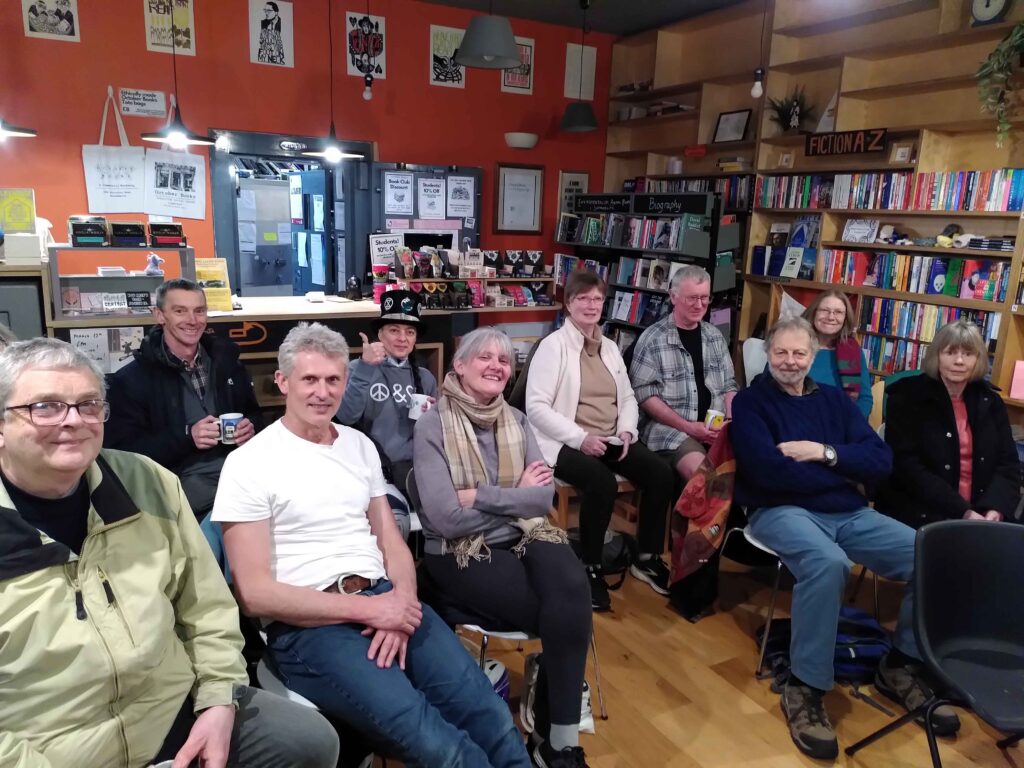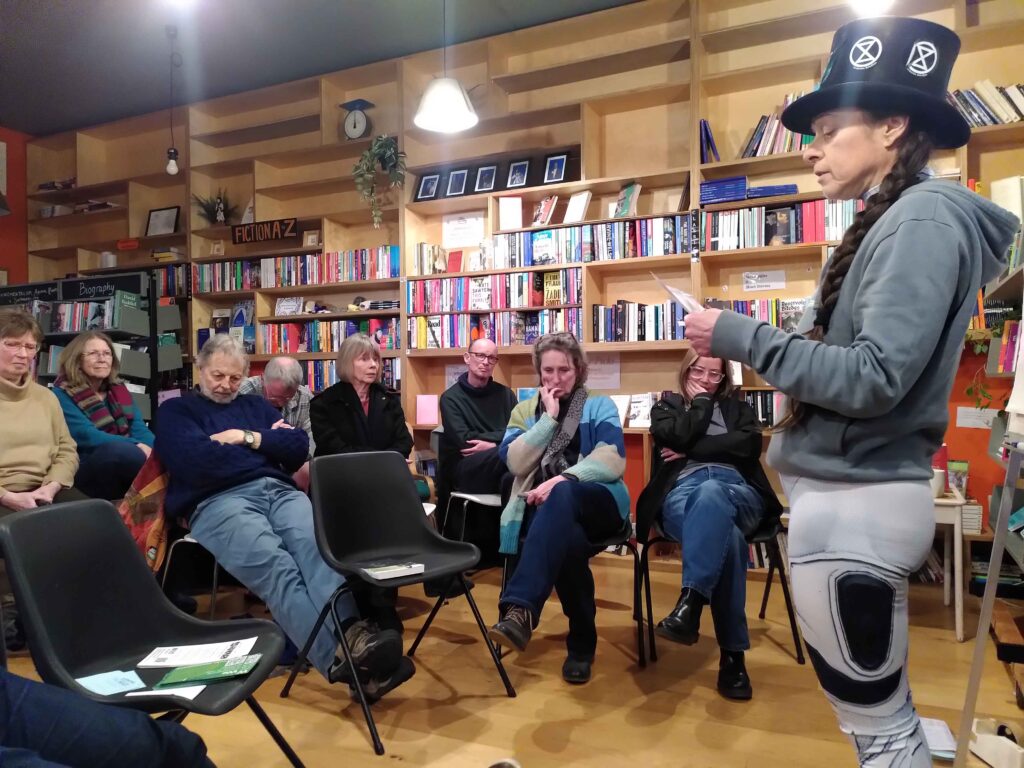
What happened
On 7th March, SoCAN, Transition Southampton and October Books hosted an evening discussing Adam Greenfield’s book “Lifehouse: Taking Care of Ourselves in a World on Fire”. Only a few days before we had learned that Adam could not join us for this. This was a huge disappointment but we also had a wonderful opportunity. Instead, we hosted around 16 people for a rapidly-planned, and somewhat ad-libbed, evening of discussion and companionship.
To start the event, we asked people to share why they had come to the event before running through the ideas in each of the book’s chapters: The Long Emergency, Mutual Care, Collective Power and Beyond Hope. It was clear from this that we all had a need to express how we experience these phenomena. We then discussed what we could do next. This post attempts to summarise the whole discussion and adds in a few thoughts that came after the event. We believe this marks the dawning of a drive to build and strengthen Southampton’s communities.
What brings you here?

We started the evening by asking our participants what had brought them to the event. There were some very simple and practical reasons, such as they heard about the event through message chat. The other reasons for people joining the conversation were that there is/are:
- There are some great things happening in our city that we need to value
- A need to be with like minded people who want to talk about the environment and climate change
- This isn’t enough being done to mitigate climate change and that we need to start adapting
- A need to stay sane, to experience the magic of collective being together and to find new ways of organising
- A desire to not experience the situation from a place of fear
- Left leaning political views
Many, possibly the majority of participants had not yet read Lifehouse and were keen to learn more. The next activities gave a taste of the book in 4 parts and allowed us to discuss what this meant for Southampton.
The Long Emergency
“civilisation’s familiar ways of ordering everyday reality, whether enacted through mechanisms of state or market, will not survive”
The state is already failing us, and with expected political, climatic, ecological, pathogenic and other shocks, we can assume that this situation will worsen.
We were talking very much in the future tense in this conversation – the implication being that we wouldn’t have to cope with this situation straightaway. In the short-medium term (next 10 years), in UK, the impacts – such as flooding – are likely to be relatively localised (city-wide or smaller) and/or short term (< 1 month) or – such as heatwaves – more widespread (regional or sub-national) but possibly shorter-term (< 2 weeks). However, with changes in climatic patterns, as well as changes in temperature, we could be facing longer periods of adverse weather such as heatwaves even in these short timescales. There is even more uncertainty with the possibility of passing climate tipping points, such as a collapse of global circulatory systems which could even create cooling of the UK climate.
We considered how that would look in terms of needing to organise the sharing and distribution of services and resources such as food, water and power. Whilst in theory we could picture organising together to help distribute these resources, there is a concern that, unlike during Covid-19, there may be an extreme shortage and therefore very little to distribute and share. Perhaps this is the first action we should take away – how do we build more local resilience in these essentials before we need to draw on it?
Also, for some in the room, and still most of society, this discussion about building an alternative to the state because the state is in decline/collapse, is quite a cognitive leap. This was recognised as important in terms of individuals’ psychological safety – it can be a considerable shock to realise how precarious our futures now are. People raised from their own experiences of people around them who seem blissfully unaware, such as farmers who notice the unusual weather but see it only as that, or friends who know that aviation contributes to global heating but continue to fly for their holidays. We also discussed whether we should be trying to communicate about climate change and its consequences to more people. Or perhaps there is another option, drawing on psychological understandings of how best to communicate important information, we can demonstrate the emergency by acting on it now?
Mutual Care
“Beyond mutual aid and disaster relief”
Greenfield draws on so many examples of how communities have organised to create services and society in response to adversity. For instance, Occupy Sandy emerged from The Occupy movement in response to the devastation of Hurricane Sandy. Other powerful models are the Black Panthers, the solidarity network in Greece when state was hollowed out, the ideas of Murray Bookchin on social ecology and how this inspired Rojava independence where there was no state so nothing to pervert Bookchin’s ideas.
Other case studies were highlighted Chicago Urban farms and studies demonstrating that the establishment of social networks and capital before disasters (e.g. post-election violence in Kenya and the nuclear disaster in Fukushima) contributes to resilience to, and recovery from, shocks. In the Kenyan case, there was suggestion that it is the diversity of people within one’s network that provided the resilience, perhaps by dissipating distrust between opposed political factions. Finally, many were able to reflect on personally experiencing the spontaneous emergence of local support groups during early stages of Covid lockdowns.
Many of these examples demonstrate how learning and flexibility is vital. The idea would be to start small scale, supporting short-term supplement or replacement where there are needs. We would then learn what works and what is needed in our local context, that way we can build a model of how to operate as and when shocks become more frequent, severe and/or long-lasting, and when there might be failure of wider distribution networks. There is a sense there in “being the change we want to see”. Care, in every sense, is lacking today but care is the foundation of community, society and humanity.
Collective Power
“All we need to image is a meshwork of Lifehouses spanning the land, each one a place where people come to avail themselves of sanctuary, restoration, sustenance and solace, each one managed and governed by the people who use it”
We understood The “Lifehouse” as a node where people gather for resources such as power or food, where they then share information and solve problems. There would be several Lifehouses in Southampton. This is most robust if the activity is federated and networked with connections established before the need arises.
There was much energy in the room to “do something more than sign petitions”, but less clarity on what to do. When asked, most people agreed that we would gather around a purpose if it were created for us – if only someone would tell us what to do. How do we create the social tipping point into action? For some, perhaps most, there was a sense that creating a Lifehouse right now feels somewhat revolutionary or at least very difficult to establish when it goes against current social norms. Are things going to have to get much worse?
Beyond Hope
“It is gathered here, in the ruin and wreckage of all our hopes for the future, that we might finally learn what it is to know care – for ourselves, for one another and for the wounded Earth that cradles us”

here was an important message that one participant brought us throughout this event, despite the serious conversation, and that is that we should continue to, share, seek and find joy in life. This is not only for our own wellbeing but we win people over by having the better party!
In Southampton’s climate and nature groups, such as Southampton Climate Action Network (SoCAN), Extinction Rebellion Southampton (XRS), we have begun talking about focussing on community cohesion and strengthening mutual aid (in contrast to our previous work in environmental advocacy and protest) as a more appropriate course of action. The sense is that simple acts of coming together in conversation can dissipate false information and fractious division. Very locally, this is needed because there has been a great deal of upset around changes to local traffic permissions in Portswood (the “Bus Gate”).
What next
“Stop waiting and start doing”
There was a clear desire to meaningfully act on our predicament, much of this in the form of questions. These focused on three themes that developed through the evening: community and/or network, care and/or resources and joy, the words used being dependent on the framing desired by those involved in the conversation.
Community/Networks: The foundation of our response is the network that we can draw on. We should develop this, identify how we bring in a diversity of people and groups. In the first instance, we can create opportunities to meet and discuss, for instance around the hub created by October Books. We each have the power to reach out beyond our usual networks, for instance to support a local initiative within which we will find people we would not otherwise connect with. One participant highlighted how they felt this was one of many good reasons to support community food distribution initiatives. Here, we should team up with Southampton Voluntary Services to discuss how we can work together to increase network connections.
Care/Resources: How do we know what we need and what we have? We can create a register of people with knowledge, skills and resources that they’d be willing to share. In fact, there are already some existing resources like the repair cafes and other local initiatives listed in the Transition Southampton Directory. Can we test how robust these are to scarcity, for instance how much food are we growing within the city and what is the scale of the shortfall were we unable to access our usual suppliers?
Joy: Could the situation with the Portwood bus gate be an important catalyst of something different, where we bring together people to find a solution to a very real problem we are experiencing right now? How can we use joy to create cohesion? Perhaps a street party! Who’s up for helping us?

